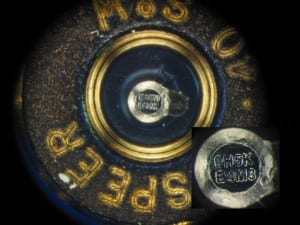NEWTOWN, Conn. – The National Shooting Sports Foundation (NSSF) and the Sporting Arms and Ammunition Manufacturers’ Institute (SAAMI) have filed a motion for a preliminary injunction on behalf of their members against the State of California in Fresno Superior Court to prevent enforcement of the state’s microstamping law. The state statute enacted in 2007, but not made effective until May 2013, requires that all semiautomatic handguns sold in the state not already on the California approved handgun roster incorporate unproven and unreliable microstamping technology.
Under this law, firearms manufacturers would have to micro laser-engrave a gun’s make, model and serial number on two distinct parts of each handgun, including the firing pin so that, in theory, this information would be imprinted on the cartridge casing when the pistol is fired.
“There is no existing microstamping technology that meets the requirement of this ill-considered law. It is not technologically possible to microstamp two locations in the gun and have the required information imprint onto the cartridge casing. In addition, the current state of the technology cannot reliably, consistently and legibly imprint on the cartridge primer the required identifying information from the tip of the firing pin, the only possible location where it is possible to micro-laser engrave the information, said Lawrence G. Keane, NSSF senior vice president and general counsel.
“The holder of the patent for this technology himself has written that there are problems with it and that further study is warranted before it is mandated. A National Academy of Science review, forensic firearms examiners and a University of California at Davis study reached the same conclusion and the technical experts in the firearms industry agree,” Keane said. “Manufacturers cannot comply with a law the provisions of which are invalid, that cannot be enforced and that will not contribute to improving public safety. Today, we are seeking injunctive relief against this back-door attempt to prevent the sale of new or upgraded semiautomatic handguns to law-abiding citizens in California.”
In 2007, California Assembly Bill 1471 was passed and signed into law requiring microstamping on internal parts of new semiautomatic pistols. The legislation provided that this requirement would only became effective if the California Department of Justice certified that the microstamping technology is available to more than one manufacturer unencumbered by patent restrictions. The California legislature subsequently reorganized certain statutes concerning the regulation of firearms, including the microstamping law in 2010. On May 17, 2013, Attorney General Kamala D. Harris provided such certification.
Smith & Wesson and Sturm Ruger have separately announced that they would no longer be selling new or improved semiautomatic handgun models in California because of the impossibility of complying with the new law.
See additional Fast Facts backgrounder on Microstamping from NSSF.
http://nssf.org/factsheets/PDF/Microstamping.pdf



